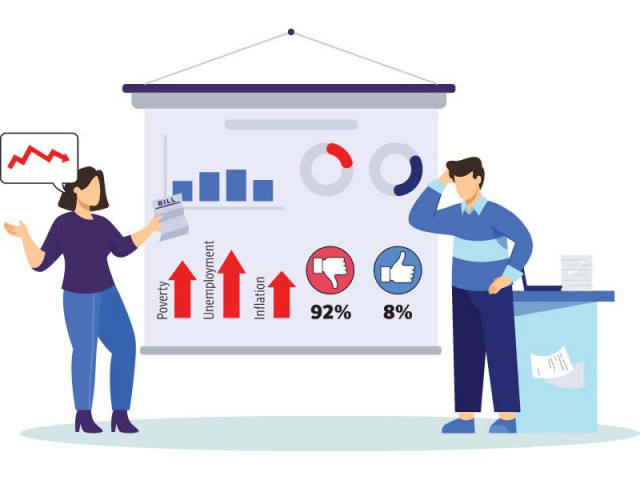Economic confidence hits new low
Ipsos survey reveals anxieties over inflation, unemployment and poverty levels

Only one in ten Pakistanis believes that the country is heading in the right direction, with economic problems ranking as the most worrying issues for them, reveals a new opinion poll.
The outcomes of the survey reflect the overall poor conditions of the country, yet the number seeing the economy as very weak has declined to 60%, according to the Consumer Confidence Index Survey conducted by Ipsos – a market research firm – last month.
The survey revealed that inflation, unemployment, and increasing poverty were the top most concerns for Pakistanis.
Citizens have been bearing continuous double-digit inflation, with the Sensitive Price Index (SPI) seeing a dramatic increase of 10% in just one week on the back of a 480% increase in the prices of gas for the poorest households.
Despite a continuous period of low economic growth, the Pakistan Bureau of Statistics (PBS) has failed to produce credible figures of unemployment and poverty in the country.
Survey findings showed that 9 out of 10 Pakistanis believed that the country was heading in the wrong direction – a ratio that was nearly 100% three months ago. This ratio was the lowest among females, as only 5% believed that Pakistan was heading towards the right direction.
Among the age group of 18 to 24 years – which would also be the target group of the political parties in the upcoming general elections, only 14% believed that Pakistan was heading in the right direction.
After hitting an all-time low in September this year, the perception of the current economic situation has marginally improved, with only 5% considering it to be strong, according to the Ipsos findings.
Over one-third of the respondents said that the economy had neither strengthened nor weakened. For the remaining 60% of respondents, the economy was weak – a ratio that was 76% in September this year. The improvement was not because of the strength of the economy but because the number of people having no opinion increased from 22% to 35%. During the last fiscal year, Pakistan grappled with the question of a looming sovereign default, which only subsided with the approval of a new bailout package by the International Monetary Fund (IMF). But it did not change the harsh economic ground realities for the majority of the people.
Read Nawaz proposes ‘ask-no-question’ policy for investment
The survey showed that inflation was the most worrying factor for Pakistanis, followed by unemployment and the increasing poverty. The past one year’s average reflected inflation as the single most worrying issue for people.
The cost of fuel, electricity, gas, household equipment, transport, food, and industrial inputs has multiplied in the past over one year. The price of electricity for less than 300 units monthly consumption is now nearly Rs12,000, which is unbearable.
Unemployment was the second major concern, followed by increasing poverty, an increase in electricity prices, and interference of state departments in each other’s matters. The people finding the interference of the state departments increased from 2% to 4% within three months, reflecting the country’s ground realities.
Pakistan’s economic and political conditions have remained vulnerable for the past many years. Survey findings confirmed that the people’s personal financial situation did not improve much. Over 40% of Pakistanis believed that the economy of their locality would weaken further in the next six months, showing increased desperation. Another one-fourth said that it would remain the same.
Hardly one-fourth of Pakistanis rated their personal financial situation as strong during the past six months. About half of respondents said that their personal financial situation was weak, while the remaining said it stayed the same. Survey results revealed that consumers were not confident and were reluctant to make investment decisions, besides having doubts about saving money and investing in their future.
Also, 92% of respondents felt less confident about their ability to save money and invest in their future. The remaining 8% were comfortable. About 98% of Pakistanis were feeling less comfortable about purchasing major items like cars and homes, showing that even domestic investors were not ready to open their purse strings. Only 4% wanted to make even any type of household purchases, indicating the growing cost of inflation on the living standards of the people.
The survey also showed that Pakistan remains the lowest on the Global Consumer Confidence Index among the comparative regional economies. The survey findings showed that Pakistan’s score was 31 on the global confidence index compared to India’s 64.1 - the world’s largest democracy.
Published in The Express Tribune, November 22nd, 2023.
Like Business on Facebook, follow @TribuneBiz on Twitter to stay informed and join in the conversation.



















COMMENTS
Comments are moderated and generally will be posted if they are on-topic and not abusive.
For more information, please see our Comments FAQ